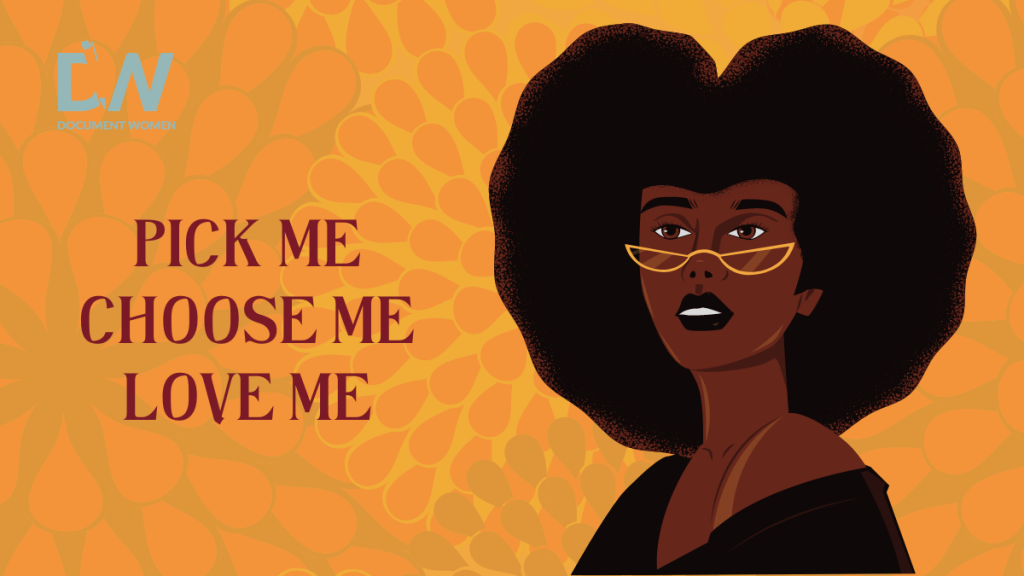Share This Article
The pick me phase: A phase that almost every growing girl faces is centring men’s feelings. Even men learn to centre other men’s feelings thanks to our patriarchal upbringing.

Sometimes it takes, what we call, a “Feminist Awakening” for many women to consciously desensitise the inherent compulsion to audition to be chosen by men and to quit putting their feelings last. We spoke to some women about instances where they coddled and pandered to men before their feminist awakening.
Iwinosa: “When I was much younger, I was taught to always accord special respect to boys and men. So I did, and unfortunately, I did it a lot. I just wanted to be greeting men and boys unprovoked. I felt like greeting them would make them like me and, when I got to university, it got worse.
Greeting boys and men was the medium I used to show my respect for them, like a validation thing, a good girl with manners thing; a girl who is well-brought-up and respectable and all that bullshit. And of course, those boys I always greet will never kick-start the greeting unless I did.
It took me having a roommate who was very stubborn in that regard to help me snap out of it. I eventually did, and now I don’t greet boys/men any more, at least not especially.
I don’t care. I will always be grateful to Tola (named changed for anonymity) for helping me without even knowing.
And I know that she doesn’t see herself as a feminist but I do. One time Tola revolted when a boy stopped her to call her attention to how she didn’t greet him. I saw her fight him with her words, she cursed the shit out of him. I was shocked; I was inspired.”
Itohan: “I used to be one of those people that went “not all men” and was “one of the boys”. I was never “like other girls” because of course, those were annoying. I didn’t like pink or “girly clothes” because, ew. I also didn’t wear any makeup. I liked the natural look because, you know, I was different. I also did a lot of bending over backwards to defend men.
Then one day, I started listening to the words women were saying and stopped navigating feminism through the eyes of men. Also, these men switched up on me with quickness but women were always there for me.”
Chioma: “God, I was embarrassing. I’m so ashamed to share but, okay. One time, I was speaking to a male friend on the phone and he was telling me about how he stopped talking to a mutual friend of ours because she was “laying the feminism on a bit too thick”. I agreed with him and said yes, he did the right thing. I don’t know why I was like that to be very honest.
Although I’m happy now that this same person came into my DMs about a week ago and asked me why I had suddenly changed, he said I had become aggressive and joined the Twitter feminists. I told him off but I don’t know if that can wash the stains of my past behaviour away.
Up until last year, I used to judge women who opened their bodies, I used to say, “I’m a feminist but I don’t like labels”, you know all that rubbish? I used to do it.
That’s it; I can not remember anything else. I think the reason why I was like this was because of Christianity. I’m not sure though, but I just know that since I stopped letting the Bible think for me and started asking the tough questions that bothered me, I felt freer. I was living in fear for years, I was stifled.”
Regina: “In secondary school, I wanted to be validated and noticed by boys so bad. I talked shit about girls to get a few laughs from them. I was so disgusting lmao (I’m so embarrassed by this second one). Okay, so you know the transition stage where you move from bra tops to bras?
My first bra was padded and so, my tits looked bigger. I got a lot of attention and I LOVED it. Then I told my mum to get me more bras and she got lace bras. I tried them on and I was so angry because I knew I wouldn’t get attention anymore. I complained and complained that I didn’t like them because they were uncomfortable and the padded ones were more comfortable and then, she got padded ones. Sigh, well, I’m happy about growth.”
Validation from men is a tedious cross to bear but it’s also a needless cross to carry. Much like every other symptom of patriarchy you’d find that there’s no light at the end of the tunnel of needless pandering and that the reward for any unpaid labour is more unpaid labour.
For these women and like many others, this phase of separation from other women and things considered women things is symbolic of what they thought to be true, that being a woman alone is not enough.

